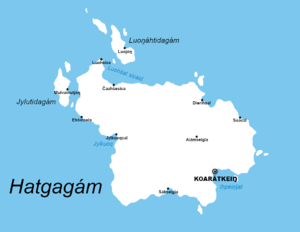Difference between revisions of "Archive:Hatgagám"
Jump to navigation
Jump to search
m |
m |
||
| Line 85: | Line 85: | ||
'''Hatgagám''' ({{small|[[Niryokulta]]:}} ''Hatgagám'' [ˈhatʰkakæ:m]) is the second biggest island in [[Akamyokulta]] that is however the most populated, with population of 28,875 inhabitants. It belongs to [[Iŋiqagáin]] archipelago consisting of 24 islands. Akamyokulta's capital [[Koarátkeiŋ]] and highest point of the country [[Aŋašilip]] (715 m) are located here. | '''Hatgagám''' ({{small|[[Niryokulta]]:}} ''Hatgagám'' [ˈhatʰkakæ:m]) is the second biggest island in [[Akamyokulta]] that is however the most populated, with population of 28,875 inhabitants. It belongs to [[Iŋiqagáin]] archipelago consisting of 24 islands. Akamyokulta's capital [[Koarátkeiŋ]] and highest point of the country [[Aŋašilip]] (715 m) are located here. | ||
The archipelago is known for its big population of [[Wikipedia:Puffin|puffins]] which is the biggest tourist attraction. | The archipelago is known for its big population of [[Wikipedia:Puffin|puffins]] which is the biggest tourist attraction. | ||
==Etymology== | ==Etymology== | ||
Revision as of 13:27, 24 August 2020
| Native name: Hatgagám Nickname: Hatág | |
|---|---|
 Map of Hatgagám | |
| Etymology | hatga 'first' + agám 'island' |
| Geography | |
| Location | The Sea of Alpa |
| Archipelago | Iŋiqagáin |
| Total islands | 15 |
| Major islands | 1 |
| Highest elevation | 715 m (2,346 ft) |
| Highest point | Aŋašilip |
| Country | |
| Capital city | Koarátkeiŋ |
| Largest settlement | Koarátkeiŋ (pop. 17,018) |
| Demographics | |
| Population | 28,875 (as of 2015); all fifteen islands' population |
| Ethnic groups | Yokultans, Durykians |
| Additional information | |
| Time zone |
|
Hatgagám (Niryokulta: Hatgagám [ˈhatʰkakæ:m]) is the second biggest island in Akamyokulta that is however the most populated, with population of 28,875 inhabitants. It belongs to Iŋiqagáin archipelago consisting of 24 islands. Akamyokulta's capital Koarátkeiŋ and highest point of the country Aŋašilip (715 m) are located here.
The archipelago is known for its big population of puffins which is the biggest tourist attraction.